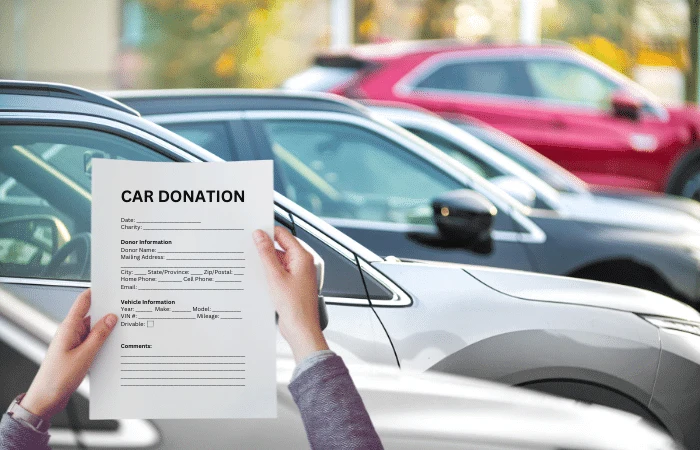Home » Blog » Car Donation Blog » How Vehicle Donations Benefit Nonprofits
Did you know that in the United States alone, over 12 million cars are scrapped each year? What if we told you that instead of being discarded, these vehicles could be transformed into a lifeline for nonprofits striving to make the world a better place? Vehicle donations have emerged as a powerful and often underappreciated means of support for charitable organizations.
In this blog, we’ll explore how vehicle donations benefit nonprofits and the broader community.
Benefits of Vehicle Donations for Nonprofits
Beyond the financial and operational advantages, car donation programs offer nonprofits an array of benefits that extend well beyond the bottom line. These donations enable organizations to foster a deeper connection with their communities and the broader public. The act of donating a vehicle becomes a bridge between donors and nonprofits, often leading to lasting relationships and partnerships that go beyond vehicle contributions.
Here are the benefits nonprofits get from vehicle donations:
1. Source of Revenue
Vehicle donations provide nonprofits with a unique source of income. When individuals donate their vehicles to a charitable organization, these vehicles can be put to several uses. The nonprofit can choose to sell the donated vehicles, either directly or through an auction, and use the proceeds to fund their various initiatives and activities.
Alternatively, they may decide to incorporate the vehicles into their operations. For example, a nonprofit could use donated vehicles to transport supplies to different locations or to provide transportation services for individuals in need. This revenue is crucial for nonprofits as it can help them sustain and expand their work.
2. Diverse Range of Donations
Vehicle donations are not limited to just cars; they encompass a wide range of vehicles. Donors can contribute trucks, boats, motorcycles, and even recreational vehicles. This diversity in donations allows nonprofits to enhance their vehicle fleet, which can better serve their communities. For instance, an organization that provides disaster relief might find boats or trucks particularly valuable in their operations.
3. Tax Deductions
Donors who contribute vehicles to nonprofit organizations often receive tax benefits as a result. Nonprofits typically help donors understand the tax implications of their vehicle donations, which can encourage more people to participate in such programs.
In many countries, including the United States, the government offers tax deductions or credits for charitable contributions, and donating a vehicle is one way to qualify for these benefits. This arrangement is a win-win situation for both donors and nonprofits, as it encourages giving while also reducing the financial burden on donors.
4. Helps the Environment
Accepting used vehicles and reusing them is an environmentally responsible practice. It contributes to environmental sustainability by reducing the number of discarded vehicles, which can otherwise end up in landfills or scrapyards. These discarded vehicles can leak harmful chemicals and pollutants into the environment, potentially causing ecological harm. By repurposing and recycling vehicles through charitable donations, nonprofits play a role in reducing the environmental impact of vehicle disposal.
5. Community Outreach
Vehicle donation programs offer nonprofits a valuable opportunity to engage with their communities. When donors contribute their vehicles, nonprofits can use this as a platform to raise awareness about their causes and missions.
This can lead to increased community involvement and support. Donors who contribute vehicles may become more connected to and engaged with the nonprofit’s work, potentially providing ongoing support beyond their initial vehicle donation.
6. Supporting Vulnerable Populations
Some nonprofit organizations, especially those working in areas like education, healthcare, or social services, rely on donated vehicles to reach vulnerable or remote populations. These vehicles are instrumental in providing essential services to those in need.
For example, a charity providing medical services in rural areas might use donated vehicles to transport medical staff and supplies to remote clinics, making sure that critical healthcare services reach underserved populations.
7. Building Partnerships
Collaborations with businesses and individuals who donate vehicles can lead to long-lasting partnerships. These partnerships can extend beyond vehicle donations and may include financial support, volunteering, or other forms of assistance.
When individuals or businesses donate vehicles to a nonprofit, it often signifies a shared commitment to the nonprofit’s mission. This shared commitment can lay the foundation for broader and more enduring partnerships, which can greatly benefit the nonprofit’s operations and ability to fulfill its mission.
Benefits of Vehicle Donations for Donors

Vehicle donations offer significant benefits to donors as well. When individuals or businesses decide to contribute their vehicles to nonprofit organizations, they can experience several advantages beyond the satisfaction of helping a charitable cause. Here are some of the benefits donors can derive from vehicle donations:
1. Tax Deductions
One of the primary incentives for donors is the opportunity to receive tax benefits. In many countries, including the United States, when individuals or businesses donate vehicles to qualified nonprofits, they can claim a tax deduction or tax credit. This can lead to substantial savings on their annual tax bill, making it a financially advantageous choice for donors.
2. Simplified Process
Nonprofit organizations often streamline the donation process, making it easy and hassle-free for donors. They typically handle the paperwork and logistics involved in transferring the vehicle, which relieves donors of administrative burdens. Donors can enjoy a simple and efficient process for contributing their vehicles.
3. Eliminating Unwanted Vehicles
Vehicle donations provide a convenient way to dispose of unwanted or unused vehicles. Instead of dealing with the complexities of selling, trading in, or disposing of an old vehicle, donors can give it to a charitable cause. This not only saves time and effort but also helps clear up space and declutter their property.
4. Supporting a Cause
Many donors have a strong desire to support charitable organizations and causes they are passionate about. Vehicle donations allow them to contribute to these causes without having to make a direct monetary donation. Donors can align their values with the mission of the nonprofit and make a meaningful impact through their vehicle contribution.
5. Environmental Benefits
Donating a vehicle for reuse or recycling has positive environmental implications. By keeping vehicles in use, donors participate in reducing waste and the environmental impact associated with disposing of vehicles in landfills. This can be an environmentally responsible choice for those concerned about sustainability.
6. Vehicle Pickup Service
Many nonprofit organizations offer free vehicle pickup services. This means donors don’t have to worry about transporting the donated vehicle to the charity’s location. The nonprofit typically arranges for the pickup, saving donors time and effort.
7. Feeling of Generosity
Donors often experience a sense of satisfaction and goodwill by contributing to a charitable organization. Knowing that their vehicle donation will be used for a meaningful purpose can be emotionally rewarding, and it allows donors to feel a sense of generosity and altruism.
Final Thoughts
Vehicle donations are a win-win for both donors and nonprofits. They provide essential financial support to organizations working towards positive social and environmental change, while donors can benefit from tax incentives and the satisfaction of contributing to a worthy cause.
If you plan to donate your car, kindly consider Donate for Charity. We are partnered with various nonprofits, so you can be confident that your contribution will go to an organization aligned with your values. So, if you have an unused or unwanted vehicle sitting in your driveway, garage, or storage, donate now!




